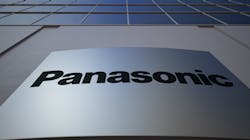Panasonic Unveils Hydrogen Generator
Panasonic Corp. has developed a pure hydrogen fuel cell generator that it claims boasts industry-leading electrical efficiency.
Launched Oct. 1, 2021, for commercial use in Japan, the 5-kilowatt (kW) generator – scalable to increase power output by linking multiple units – produces power through a chemical reaction with high-purity hydrogen and oxygen in the air, Panasonic stated. Observing that the generator requires no fuel processing device to extract hydrogen from natural gas, Panasonic maintains the product achieves 56% electrical efficiency. The company calls that efficiency level is “the industry’s best” for a pure hydrogen fuel cell generator.
In addition to scalability and 56% electrical efficiency, Panasonic noted other generator features include:
- Applicability to cogeneration when linking the generator to a hot water storage unit, converting heat from the fuel cell to hot water and achieving 95% total energy efficiency via heat recovery
- Power generation ability during an outage by connecting the generator to a resistor unit and a startup power supply unit
- Quick, approximately one-minute startup capability.
Panasonic plans to market the hydrogen fuel cell generator under the “H2 KIBOU” trade name.
About the Author
EnergyTech Staff
Rod Walton is head of content for EnergyTech.com. He has spent 17 years covering the energy industry as a newspaper and trade journalist.
Walton formerly was energy writer and business editor at the Tulsa World. Later, he spent six years covering the electricity power sector for Pennwell and Clarion Events. He joined Endeavor and EnergyTech in November 2021.
He can be reached at [email protected].
EnergyTech is focused on the mission critical and large-scale energy users and their sustainability and resiliency goals. These include the commercial and industrial sectors, as well as the military, universities, data centers and microgrids.
Many large-scale energy users such as Fortune 500 companies, and mission-critical users such as military bases, universities, healthcare facilities, public safety and data centers, shifting their energy priorities to reach net-zero carbon goals within the coming decades. These include plans for renewable energy power purchase agreements, but also on-site resiliency projects such as microgrids, combined heat and power, rooftop solar, energy storage, digitalization and building efficiency upgrades.
